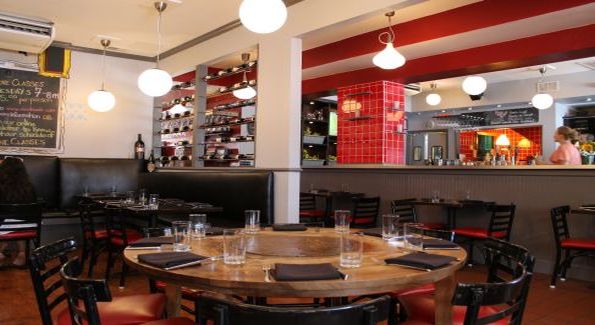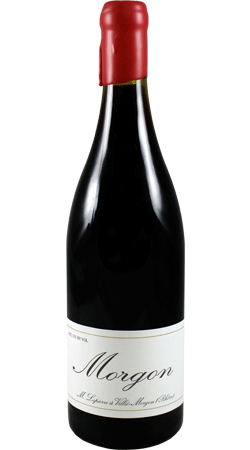Vinoteca eschews the young wine in favor of the region’s higher quality bottles.
By Kelly A. Magyarics

Vinoteca's NO-Veau Beaujolais event spotlights the wine region's higher quality offerings. (Photo by Vinoteca)
“Le Beaujolais Nouveau est arrivé! Le Beaujolais Nouveau est arrivé!” Every year around this time, you can’t pick up a wine magazine or browse a food or wine website without reading about the traditional practice of releasing this year’s vintage Beaujolais Nouveau, leaving fans giddy with excitement, and detractors completely underwhelmed. For the uninitiated, Beaujolais Nouveau is a light red wine produced in France, south of Burgundy, with Gamay grapes. By law, it cannot be released to the consumer until after midnight on the third Wednesday in November after the harvest, and cannot be sold after the following August 31. Particularly snarky critics like to point out that you’re lucky if it even lasts that long on the shelf.
Beaujolais Nouveau is characterized as being a simple, quaffable, low tannin red wine, with notes of strawberry and raspberry. Because of a production method called (Alert! Cocktail party tidbit fodder!) carbonic maceration, where whole clusters of grapes are placed in a vat under a layer of carbon dioxide and start fermenting using the grapes own enzymes without yeast, the wine can also pick up distinctively recognizable aromas of bubblegum and bananas; so much so that a good friend of mine, who used to be a fan, can’t even sniff the stuff now without thinking of a gumball.
If you dig this style of wine, then go for it. But if, like me, you find it to be more than a bit disappointing, don’t spite your wine-loving self by dismissing the entire Beaujolais category. Just remember these two important words to look for on the label when perusing store shelves or a restaurant wine list: “Cru” and “Villages.”

The 2011 Marcel Lapierre from the Cru village of Morgon will be showcased at Vinoteca's NO-Veau Beaujolais promotion. (Photo by Marcel Lapierre winery)
Let’s start with a little primer. In the north and west sections of the Beaujolais region, vineyards are planted on hillsides on granite and schist. Since Gamay thrives on this type of soil, grapes planted here produce more complex, richer, interesting wines than those made with grapes on the flat sandy vineyards. Thirty-nine villages are permitted to label their wines “Beaujolais Villages” representing a quarter of the wine produced in the region. Within these villages, ten are designated as producing extremely remarkable wines—these are labeled “Cru.” If you gravitate towards powerful, fuller-bodied reds, look for Crus from Morgon or Moulin à Vent (these wines will also improve in the bottle). Lighter-style wines are found in Fleurie and Brouilly produces the most, with the widest availability. In general, producers including Georges DuBoeuf, Louis Jadot and Latour are the most widely distributed. Some outstanding bottles to seek out are the 2009 DeBeaune Morgon Belles Grives, 2009 Domaine de la Chaponne Morgon, 2009 Clos des Quatre Vents Fleurie and the 2009 DeBeaune La Madone Fleurie.
U Street wine bar Vinoteca shares my propensity for better-drinking Beaujolais; their first annual Beaujolais NO-veau party vows to set the record straight. On Thursday November 15, they will be showcasing a selection of complex, unique “Better Beaujolais.” All day on the 15th, Vinoteca will offer $10 specials on two artisan Beaujolais wines. The 2011 Marcel Lapierre from the village of Morgon is from an esteemed Cru appellation. It’s light-bodied, with bright red fruit aromas including strawberry and raspberry. The 2011 Jean-Paul Brun is a Chardonnay-based Beaujolais Blanc, with notes of peach blossom and green apple. To put the latter in perspective, Beaujolais blancs comprise only 1% of the region’s wines, so drink it when you find it.
“True Beaujolais is not only extremely delicious and complex, it is also relatively affordable and can be drank several years after its release, unlike Nouveau which tends to be dead by Christmas time,” says Vinoteca wine director Tim Galvin. “More to the point, why drink swill when for literally just a few dollars more, you can have something profound?”
Smart words, indeed. For more information about the wines of Beaujolais, head to www.discoverbeaujolais.com
Kelly Magyarics is a wine and spirits writer, and wine educator, in the Washington, D.C. area. She can be reached through her website, www.kellymagyarics.com, or on Twitter @kmagyarics.
